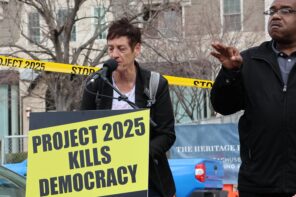As 2022 draws to a close, amongst the last-minute hustle before the New Year, there’s a moment for reflection. In my line of work this isn’t necessarily a joyful task, but it is an essential one—especially for what it can tell us about the future.
The year began with the long shadow of January 6th of the previous year, 2021, hanging over the nation—and the continuous efforts by the Republican Party to try and discredit the committee tasked with investigating it. Their stance would not change over the course of the year, nor did they waver as testimony after testimony from Republican officials (whose careers in the party are now effectively over) piled up, forming a mountain of damning evidence against the former President.
With a Republican-led House looming over the January 6th committee, the panel has published an 845-page-long report, summing up their investigations. The report serves as the foundation for their criminal referral of Trump to the Department of Justice, accusing him of conspiracy to defraud the government, inciting an insurrection and obstructing an official proceeding. As law scholar Aziz Huq from the University of Chicago writes:
“In the end, the insurrection was just the back-up plan. (…) The former president floated the idea of marching on the Capitol with a ‘large and wild crowd’ only after his White House advisers and lawyers aggressively tried to quash a quilt of crazy schemes to use federal courts, election administrators, state legislators and ersatz presidential electors to thwart the lawful, peaceful transfer of power. It was a last-ditch resort. And the violence of Jan. 6 would have had its intended effect only if some of those legal machinations had already put enough sand in the gears of the democratic process.”
The report is a document unprecedented in modern American history—and, like the crime it investigated (the storming of the Capitol) the public was able to watch the Jan 6 committee make its case on their screens—a case which, if you follow the evidence in good faith, can only lead to one result: Indictment.
During the first half of 2022 it also looked like Democrats were marching to the slaughter in the midterm elections. Along with pretty much everyone else, Republicans, over-confident and high on their own ideological supply, expected a rousing victory in November. Until summer, that is.
The Supreme Court (a.k.a. the “Federalist Society Six”)
The summer months, usually the least busy time in DC, brought us a number of political earthquakes, each of which, under normal circumstances, would have dominated headlines for weeks. First, the FBI searched the former President’s Mar-a-Lago residence, prompting bitter reactions from a number of Republicans, in some cases openly weighing political violence as a tool of reaction.
Lindsey Graham predicted “riots in the streets,” should Trump be indicted, while Arizona Republican Andy Biggs and the Texas GOP compared the FBI raid to the crossing of “the Rubicon”—implying that a point of no return has been reached. The implications of the phrase are momentous: Caesar’s crossing of the Rubicon was the beginning of the end of the Roman Republic, and would give rise to the Roman Empire. At the same time, the Right has shown again and again, they’d be very happy to crown a Caesar of their own.
Then, during nine long, sweltering days in June, the captured Supreme Court delivered a number of rulings attacking the very foundation of egalitarian democracy, effectively announcing their intention to roll back whatever progress has been made since the establishment of the civil rights order in the 1960s.
But no case rattled and enraged the nation as much as Dobbs v. Jackson Women’s Health Organization, in which the Court overruled the historic precedents of Roe v. Wade (1973) and Planned Parenthood v. Casey (1992), with devastating consequences for the rights of pregnant people. Even in red states like Kansas and Kentucky, ballot measures seeking to limit abortion access failed—proving, again, that the majority of Americans are not divided on the issue of reproductive rights.
The summer’s events proved that the framing shared by most media outlets —democracy and abortion rights vs. the economy and “kitchen table” issues—is deeply misleading. And no wonder: What could be more “kitchen table” than the rights of the people sitting around the kitchen table? It was one of the more uplifting moments of the year, one that the polls had foreseen quite accurately (even if no one believed them) since the events of the summer. Democrats did lose the House of Representatives, but only just barely—and they managed to hold the Senate in a repeat of the Georgia run-off.
Some small cracks in the GOP’s resolve regarding the Big Lie have become noticeable: prominent figures on the Right, like Charlie Kirk and Laura Ingraham, used the midterm defeat to criticize the focus on alleged voter fraud and demonization of early voting—which they themselves helped facilitate. Those who predict the end of Republican cries of voter fraud, however, are quite likely wrong: The GOP’s myth-making about alleged Democratic voter fraud started long before Trump.
Years before Trump’s Big Lie, the Heritage Foundation’s Hans von Spakovsky had laid the groundwork that would later enable the Big Lie to flourish. The Republican Party has invested too many years in this cornerstone of their narrative to simply throw it overboard. We might, however, see a return of more dog whistle-y claims of voter fraud, like discriminatory voter-ID-laws rather than explicit claims to supporters that their votes won’t count.
In the meantime, the Supreme Court is currently hearing cases that prove an existential threat to civil rights and democracy-saving checks and balances. In 303 Creative v. Elenis, the Right seeks to attack not just gay rights, but to make discrimination against any protected class possible. And the fact that Moore v. Harper—and with it, the absolutely unhinged “Independent State Legislature Theory”—is even being heard by the highest court of the land should be cause for further alarm. In this case, the court could overrule a 100-year-old precedent—and pull the plug on American democracy.
But even if the “Federalist Society Six” don’t go for the most extreme possible ruling, we shouldn’t interpret it as a win for democracy. In all likelihood it would simply mean that instead of a single blow, they will have chosen a (slightly) stealthier strategy to achieve their goals—not that their goals have changed.
White Christian minority rule
White Christian nationalism, 2022 has shown, is here to stay—and the slide toward authoritarianism isn’t slowing down anytime soon. Pundits predicted the GOP would pivot back toward the center after the overturn of Roe v. Wade, and then again after the disappointing midterm elections. They were wrong both times. Whether Trump or DeSantis emerges as the eventual nominee, or even someone else—the GOP’s political infrastructure is in place, and the party is consistently and openly dedicated to an anti-democratic goal: The establishment of White Christian minority rule, democracy be damned.
The midterms also showed that the endorsement of, and open flirtation with, political violence is no longer taboo in the Republican party. The candidates who went about it in the most blatant, crass way, might have lost—but they weren’t kicked out by their party. The lines have been drawn clearly: The Republican Party has declared “the Left” not just their political opponent, but mortal enemy, a deeply un-American force that threatens the very core of “real” (read White, Christian) America, which must be stopped. They will continue to fight about how to achieve this in 2023.
During 2022, some voices within the Right grew louder which called for the open embrace for totalitarianism and fascism, to do away with libertarianism in order to fully embrace the tyrannical use of state power against those whose very existence threatens a White, conservative, Christian America: doctors who administer gender affirming care or abortions, parents who accept their LGBTQ children, and of course, LGBTQ people themselves.
During 2022, the Republicans’ violent rhetoric reached new lows—and spawned real life violence. Thomas Lecaque and I predicted this several months ago when we drew parallels between the violent anti-abortion and anti-trans hate campaigns. It comes as no surprise that anti-abortion violence and anti-LGBTQ violence have both risen in 2022—and there’s no indication that this will slow down in 2023.
Sure, Republican candidates who lost in the midterms mostly focused on anti-trans hate, but don’t fool yourself into thinking that this will lead to a change in policy. This is a party dedicated to minority rule—the very fact that they’re unwilling to change unpopular policy positions is what led them to this point.
A genocide rehearsal
The Lemkin Institute for Genocide prevention issued a very poignant warning in late November 2022 regarding the genocidal nature of the anti-trans hate machine:
“The Lemkin Institute for Genocide Prevention voices its concern over the growing number of laws introduced in the United States that target transgender individuals and the transgender community. Anti-trans hostility in the US has become a staple of the Republican Party’s election strategy and is clearly being used to stoke voters’ fears of a changing world by raising the specter of a malevolent polluting force tied to liberalism, cosmopolitanism, and democracy. The Lemkin Institute believes that the so-called “gender critical movement” that is behind these laws is a fascist movement furthering a specifically genocidal ideology that seeks the complete eradication of trans identity from the world.”
Anti-trans hate has become one of the leading uniting causes amongst various right-wing movements globally—one of the reasons for which is its integrability into centrist, feminist and even leftist milieus. As the Lemkin Institute states:
“While members of the gender critical movement may argue that they do not seek to kill the physical bodies of transgender people, they do openly seek to eradicate transgender identity from the world, following a genocidal logic similar to the US, Canadian, and Australian boarding schools that sought to “kill the Indian, [and] save the man.” Once it becomes acceptable for one group of people to be criminalized for expressing their identity, then society becomes vulnerable to the genocidal targeting of other groups as well. In fact, anti-trans initiatives are closely tied to assaults on the rights of women, people of color, minority religious communities, and immigrants in the US and elsewhere. The criminalization and harassment of the trans community can serve as a rehearsal for more generalized targeting of unwanted groups within a genocidal ideological structure. There is no shutting the floodgates once states and societies acquiesce to the eradication of a specific people from the earth.
Trans-exclusionary feminists (TERFs) across the world have allied themselves with the far-right organizations that seek to curtail women’s rights. The UK has long been the center of Europe’s anti-trans movement, but in 2022 anti-trans voices gained prominence in German media as well. This is likely a trend we’ll see continue in 2023, since the anti-trans disinformation campaign by the Right serves as a profitable potential radicalization pipeline.
Marc-André Argentino, who writes about “ideologically motivated violent extremist trends,” and his colleagues at the Combating Terrorism Center at West Point have also noted worrying trends when it comes to violent terror attacks perpetrated by singular individuals which have spawned others:
“In our analysis of the Buffalo attack, we found that each of these attacks, and dozens of smaller instances of violence and attempted violence, followed a “cultural script.” In each instance, this crop of extreme-right terrorists who claimed inspiration from the Christchurch attack have sought to exceed its death toll, incite further violence, and honor the attacks with their own violence. The Buffalo and Bratislava attacks conformed to all three of these aspirations, this cultural script was also attempted in the failed plots in Italy and Sweden. There is a kind of “wiki effect” to these attacks, with each individual attacker contributing to the larger product of the far-right extremist movement. Each individual offers an ideological framing and/or a set of tactics, techniques, and procedures (TTPs) on how to carry out mass shootings to any potential future mass shooter and why it should be done. Given the copycat nature of extreme far-right attacks and case after case of individuals drawing inspiration from the like minded terrorist actors who preceded them, this is of significant concern and a trend that will likely continue into 2023.”
When we zoom out of the US and look towards 2023 globally, we see entire democracies under threat. Sure, the recent right-wing coup attempt in Germany had no real chance of actually succeeding. But that can’t be the only way to measure dangers to democracy—because then, we might as well hand over our democracies to the Right as we speak. It’s comparable to a common response to the “fascism” question: If the only fascism we recognize is one that looks exactly like in the 1930s, with an openly fascist government and state-controlled media, we’ll fail to see the next fascism coming. A fascist state doesn’t emerge out of nothing—in fact, the conflict about how far Republicans should push oppression using the mechanisms of the state is eerily reminiscent of the conflicts in Italy in the 1930s. As historian John Ganz points out:
“(…) this tension between conservative elements of the bourgeoisie and the rowdy mob of the “party” is straight out of fascism: the early crises of Mussolini’s rule revolved around conservative “normalizers” versus the radical demands of the party ras [local leaders who controlled paramilitary violence].”
Fascism emerges slowly, over time, turning defeats into stories of betrayal, martyrdom, blood and revenge. If it can only be called a coup once there are tanks in front of the White House or the German parliament—if it can only be fascism once armbands are being worn—it will already be too late.
Failed coups have the potential to galvanize those already indoctrinated. They have the potential to teach fascist movements strategically smarter, more foolproof ways to gain power. Look at German history—Hitler’s first coup failed miserably. All too often, fascists are a laughing stock—until they become powerful. Take the (latest) German coup attempt by a right-wing terror group: its probability of success is the wrong metric if we’re looking at the big picture.
Sure, they were very unlikely to succeed in overthrowing the government. But they still could have caused a fair amount of bloodshed and damage. And it shows, once again, that democracy is under attack, not just from the fringes but from bad-faith actors who are trying to infiltrate democratic systems only to burn them down or hollow them out until they’re a mere façade.
In Hungary, authoritarian Prime Minister Viktor Orbán is admired by the American and European Right. Italy voted for their first fascist leader post-World War II—a shocking event which chillingly was downplayed in some of Germany’s conservative-leaning newspapers. Yes, Javier Bolsonaro lost his reelection in Brazil—but some of his supporters aren’t ready to accept his defeat, violently clashing with the police and calling for the military to overthrow the government.
Democracy can never be taken for granted—especially not during a period of economic hardship, looming climate change, and a lingering pandemic. Remember: Fascism offers a seemingly easy solution for crises both real and imaginary. And we might be a mere crisis or two from fascists gaining ground in what already is a perilous situation for democracy. Solidarity, compassion, and knowledge will be needed—in 2023 perhaps more than ever.
The continued resolution for the new year for me and many of my colleagues is to keep up the work we do—to analyze, explain and contextualize. To give people the tools and knowledge to not only diagnose the threat facing our democracy but to treat it as well. So please stay vigilant and stay safe—and we’ll see you in the new year.





